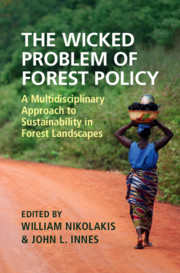 The Wicked Problem of Forest Policy
The Wicked Problem of Forest Policy from Part I - Wicked Problems and Policies
Published online by Cambridge University Press: 24 July 2020
REDD+ (reduced emissions from deforestation and forest degradation) was introduced as a key policy measure to mitigate global climate change in tropical forests. REDD+ is framed as an incentive-driven payment for ecosystem services (PES) programmes for carbon sequestration and storage. REDD+ is also performance-based and demands substantial institutional change. Implementing REDD+ implies engaging and confronting several interests, creating complex and wicked problems for policy-makers. This chapter analyzes REDD+ in Kilosa, Tanzania; the ‘Bolsa Floresta’ project in the State of Amazonas, Brazil; and in the Bikoro, Equateur Province of the Democratic Republic of Congo (DRC). Forests are important to livelihoods in each of these contexts, but they vary in power structure and history. These variations aside, the three cases offer an opportunity to learn about the challenges REDD+ has encountered ‘on the ground’.
To save this book to your Kindle, first ensure no-reply@cambridge.org is added to your Approved Personal Document E-mail List under your Personal Document Settings on the Manage Your Content and Devices page of your Amazon account. Then enter the ‘name’ part of your Kindle email address below. Find out more about saving to your Kindle.
Note you can select to save to either the @free.kindle.com or @kindle.com variations. ‘@free.kindle.com’ emails are free but can only be saved to your device when it is connected to wi-fi. ‘@kindle.com’ emails can be delivered even when you are not connected to wi-fi, but note that service fees apply.
Find out more about the Kindle Personal Document Service.
To save content items to your account, please confirm that you agree to abide by our usage policies. If this is the first time you use this feature, you will be asked to authorise Cambridge Core to connect with your account. Find out more about saving content to Dropbox.
To save content items to your account, please confirm that you agree to abide by our usage policies. If this is the first time you use this feature, you will be asked to authorise Cambridge Core to connect with your account. Find out more about saving content to Google Drive.